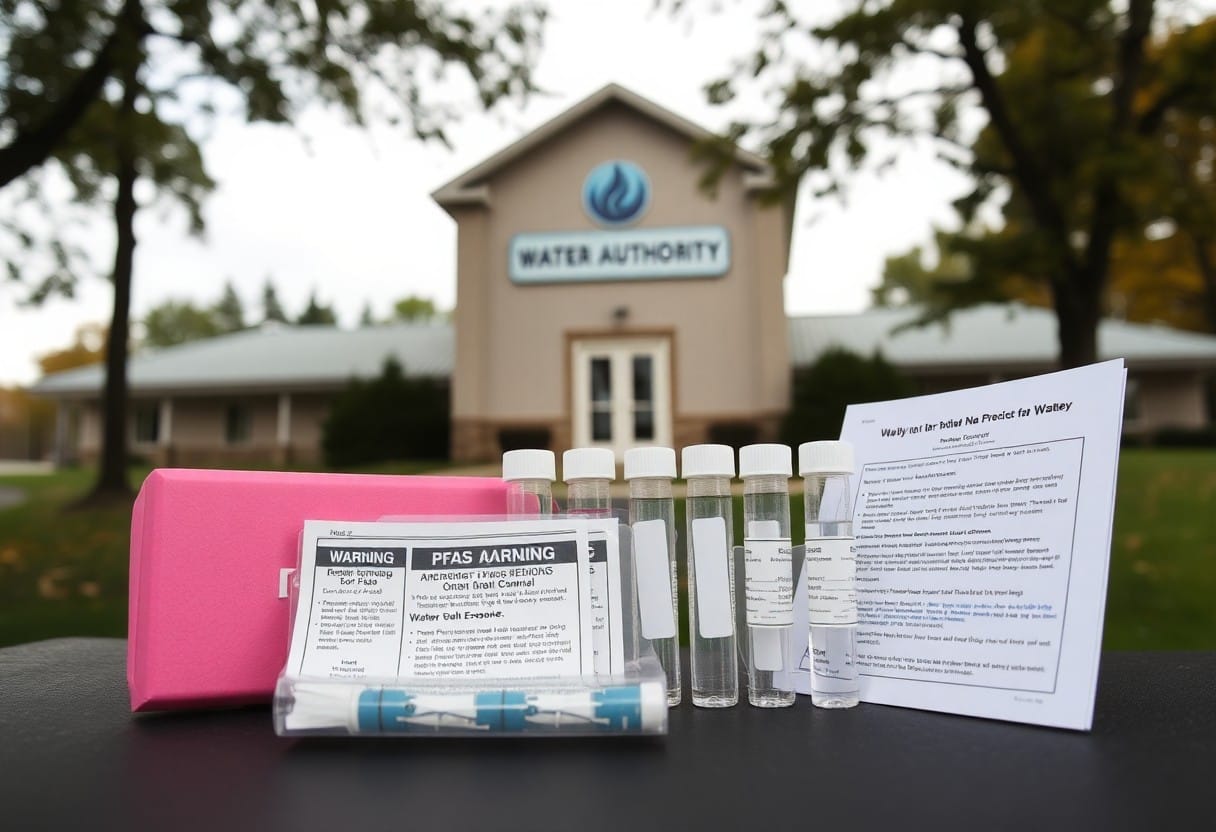You may not realize the potential dangers of PFAS exposure in Fayetteville, particularly from emissions linked to Chemours. This chemical, often referred to as “forever chemicals,” can accumulate in your body and the environment, leading to various health issues. It is imperative to comprehend the extent of the contamination, as well as the lack of transparency in communication from the company regarding the risks it poses to your health and wellbeing. Stay informed about what you can do to safeguard yourself and your community.
Overview of PFAS
While many residents in Fayetteville are unaware, New ‘forever chemicals’ polluting water near North Carolina pose significant health risks. PFAS, or per- and polyfluoroalkyl substances, are a group of human-made chemicals that have gained notoriety for their persistent environmental presence and potential dangers to human health.
What are PFAS?
Across the globe, PFAS are often referred to as “forever chemicals” due to their ability to resist degradation. These substances have been used in a variety of everyday products, from non-stick cookware to stain-resistant fabrics, leading to widespread environmental contamination.
Sources of PFAS Exposure
With numerous sources of exposure, PFAS can infiltrate your life through various everyday items. Common pathways include contaminated drinking water, food packaging, and consumer products that contain these chemicals.
Overview of PFAS exposure reveals that you may be at risk from several everyday sources. Drinking water near industrial sites, such as those operated by Chemours, is a primary concern, often leading to heightened levels of PFAS in local supplies. Food packaging, particularly fast food wrappers and microwave popcorn bags, can also leach PFAS into your meals. Additionally, household products like stain-resistant sprays can contribute to contamination within your home environment, placing you and your family at risk. Understanding these sources empowers you to take action to mitigate your exposure effectively.
The Chemours Company
Assuming you are familiar with the chemical industry, Chemours plays a significant role in producing various chemicals, including PFAS, which have raised health concerns in communities like Fayetteville. Founded in 2015 after spinning off from DuPont, Chemours has established itself as a major player, impacting local environments and public health through its production and disposal practices.
History and Operations in Fayetteville
Among the notable aspects of Chemours’ history in Fayetteville is its operations at the nearby Fayetteville Works plant, which has been in existence for decades. This facility has been instrumental in the company’s production of fluoroproducts, contributing significantly to the local economy, but it has also raised alarms related to PFAS contamination in the surrounding areas.
Practices and Safety Regulations
Chemours has faced scrutiny over its safety practices and adherence to regulations concerning PFAS. While the company claims to follow federal and state guidelines, there have been persistent allegations of inadequate measures in place to protect the local community from potential exposure to harmful substances.
Practices in the Fayetteville operations include chemical manufacturing and waste disposal protocols that have come under fire for lacking transparency. You might find it alarming that despite a growing body of evidence linking PFAS to serious health issues, Chemours has been criticized for its insufficient engagement with the community and a perceived failure to disclose vital information about emission levels. Improved oversight and rigorous safety measures are necessary to ensure your health and environment are safeguarded from the risks associated with these toxic chemicals.

PFAS Exposure in Fayetteville
Clearly, the presence of PFAS in Fayetteville’s environment has raised significant concerns among residents. These toxic substances, often referred to as “forever chemicals,” have been detected in drinking water and soil, potentially impacting your health and that of your community. Understanding the sources and exposure pathways of PFAS is imperative in addressing this growing crisis.
Health Risks Associated with PFAS
By acknowledging the health risks associated with PFAS exposure, you empower yourself with knowledge. Studies indicate that these chemicals can lead to serious health issues, including liver damage, thyroid disorders, and reproductive concerns. Long-term exposure may also increase the risk of certain cancers, making it imperative for you to stay informed about potential impacts on your health.
Community Concerns and Responses
Behind the growing discontent in Fayetteville lies a community grappling with fear and uncertainty regarding PFAS contamination. You may have noticed local advocacy groups forming, pushing for greater transparency and action from Chemours and local authorities. These initiatives aim to ban PFAS products and advocate for stricter regulations, reflecting your dedication to protecting the health and well-being of your community.
Further galvanizing community response, residents have voiced their concerns at town hall meetings, demanding more transparency from Chemours about PFAS levels in drinking water and local environmental health risks. You might find that community-led initiatives are actively engaging local government and calling for testing and remediation actions. These efforts underline the determination to combat the potential hazards linked to PFAS exposure and ensure that your voices are heard in these critical discussions.
Government Regulations and Oversight
Keep in mind that understanding the regulatory landscape surrounding PFAS is vital for your awareness of potential risks and community actions. Regulations from both federal and state levels play a pivotal role in managing PFAS exposure and ensuring safety standards that protect your health and environment.
Federal Guidelines on PFAS
After years of concern over PFAS, the federal government has begun to outline guidelines that aim to address exposure risks. However, these guidelines may not be enough to safeguard you, given the lack of enforceable limits on these harmful chemicals in drinking water and the slow process of establishing stringent regulatory measures.
State Actions and Local Initiatives
On the state level, various agencies are stepping up to manage PFAS contamination more proactively. Different states are enacting legislation aimed at monitoring and regulating PFAS levels, which means your local water supply could soon be subject to stricter testing and reporting requirements.
Another significant aspect of addressing PFAS involves grassroots initiatives within your community. Local coalitions and organizations are raising awareness, pushing for more transparency in reporting, and advocating for stronger protective measures. Positive strides include the implementation of rigorous testing standards and community meetings, which empower you to engage directly in discussions about your health and safety. It’s important to prioritize your awareness and participation, as these initiatives can lead to meaningful changes in how PFAS exposure is managed in your area.
The Role of Community Advocacy
Unlike many corporations that prioritize profit over public health, community advocacy plays a vital role in raising awareness about the dangers of PFAS exposure in Fayetteville. Local organizations and concerned residents are banding together to demand transparency from Chemours, seeking to hold them accountable for the environmental and health impacts of their operations. This grassroots effort not only fosters solidarity among community members but also empowers you to take an active stance in safeguarding your environment and health.
Grassroots Movements and Activism
With increasing public concern about PFAS, grassroots movements have emerged in Fayetteville to advocate for stricter regulations and better health protections. Activists are working tirelessly to unite the community, educate the public, and pressure local leaders to take action against harmful chemical exposure, ensuring your voices are heard and your rights are protected.
Public Awareness Campaigns
On the frontlines of combating PFAS pollution are public awareness campaigns that aim to inform you about the risks associated with these chemicals. These campaigns utilize a variety of platforms to spread knowledge about PFAS health effects and environmental contamination, helping you understand the importance of advocating for safer practices in your community.
The impact of public awareness campaigns cannot be overstated. The use of social media, community events, and informational workshops empowers you with critical knowledge about how PFAS can affect your health and the environment. By increasing understanding of the dangers posed by these chemicals, campaigns inspire community action and foster a sense of urgency to demand change from Chemours and local policymakers. Engaging with these initiatives not only aids in your own protection but also strengthens community solidarity against corporate negligence.
The Future of PFAS Management
Despite growing awareness of the dangers associated with PFAS exposure, managing these substances requires significant advancements. You must stay informed about regulations, community initiatives, and technological developments aimed at mitigating the effects of PFAS on public health and the environment. Without proactive measures and a strong commitment to transparency, there may be more obstacles to effectively addressing contamination issues in Fayetteville and beyond.
Emerging Technologies for PFAS Treatment
Future solutions for PFAS treatment focus on innovative technologies that can effectively minimize contamination. You should be aware of cutting-edge methods like advanced oxidation processes or adsorption techniques that are being developed and tested to remove PFAS from water sources. These technologies are important for ensuring safe drinking water and reducing your overall exposure to these harmful chemicals.
Long-Term Environmental Impact
Emerging evidence suggests that the long-term environmental impact of PFAS is profound and requires immediate attention. Continuous accumulation of these chemicals in soil and water can affect local ecosystems and human health. You should know that prolonged exposure to PFAS has been linked to several health issues, including cancer and liver damage. Furthermore, PFAS compounds are persistent in the environment, which complicates remediation efforts and prolongs the risk to your community. Understanding and addressing these implications is necessary for protecting both the environment and public health.
For instance, studies indicate that PFAS can bioaccumulate within your local food chain, leading to higher concentrations in wildlife and potentially impacting the safety of your food sources. This long-lasting presence underscores the importance of comprehensive environmental monitoring and clean-up initiatives. Your awareness and advocacy for responsible PFAS management are vital in pushing for strategic actions that can minimize these significant risks and support healthier ecosystems for future generations. By demanding transparency and effective solutions, you play a role in shaping a safer future for Fayetteville.
Summing up
Ultimately, you deserve transparency regarding PFAS exposure in Fayetteville, as Chemours has not fully disclosed the potential risks associated with these chemicals. It’s vital for you to stay informed and advocate for more rigorous testing and oversight. For further context, you can check out how the EPA is urged to reconsider Trump-era Chemours decision on chemical testing. Your awareness and action can play a significant role in ensuring a safer environment for your community.


















